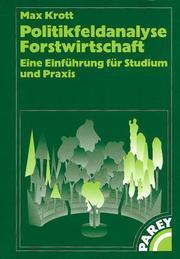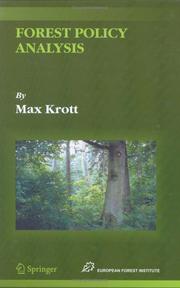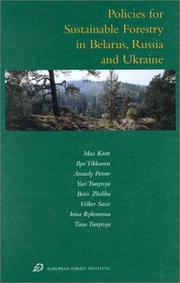| Listing 1 - 10 of 10 |
Sort by
|

ISBN: 3826332741 Year: 2001 Publisher: Berlin : Parey,
Abstract | Keywords | Export | Availability | Bookmark
 Loading...
Loading...Choose an application
- Reference Manager
- EndNote
- RefWorks (Direct export to RefWorks)
Digital
ISBN: 9781402034855 Year: 2005 Publisher: Dordrecht Springer
Abstract | Keywords | Export | Availability | Bookmark
 Loading...
Loading...Choose an application
- Reference Manager
- EndNote
- RefWorks (Direct export to RefWorks)
Economics --- Environmental protection. Environmental technology --- Forestry --- economie --- milieuzorg --- bossen
Book
ISBN: 3319340778 3319340794 Year: 2016 Publisher: Cham : Springer International Publishing : Imprint: Springer,
Abstract | Keywords | Export | Availability | Bookmark
 Loading...
Loading...Choose an application
- Reference Manager
- EndNote
- RefWorks (Direct export to RefWorks)
Researchers in the environmental sciences are often frustrated because actors involved with practice do not follow their advice. This is the starting point of this book, which describes a new model for scientific knowledge transfer called RIU, for Research, Integration and Utilization. This model sees the factors needed for knowledge transfer as being state-of-the-art research and the effective, practical utilization to which it leads, and it highlights the importance of “integration”, which in this context means the active bi‐directional selection of those research results that are relevant for practice. In addition, the model underscores the importance of special allies who are powerful actors that support the application of scientific research results in society. An important product of this approach is a checklist of factors for successful knowledge transfer that will be useful for scientists. By using this checklist, research projects and research programs can be optimised with regard to their potential for reaching successful knowledge transfer effects.
Life sciences. --- Science education. --- Environmental law. --- Environmental policy. --- Sustainable development. --- Life Sciences. --- Life Sciences, general. --- Environmental Law/Policy/Ecojustice. --- Sustainable Development. --- Science Education. --- Environmental sciences --- Environmental science --- Science --- Study and teaching. --- Biosciences --- Sciences, Life --- Environment law --- Environmental control --- Environmental protection --- Environmental quality --- Environmental policy --- Law --- Sustainable development --- Science education --- Scientific education --- Development, Sustainable --- Ecologically sustainable development --- Economic development, Sustainable --- Economic sustainability --- ESD (Ecologically sustainable development) --- Smart growth --- Sustainable economic development --- Economic development --- Law and legislation --- Environmental aspects --- Environment and state --- Environmental management --- State and environment --- Environmental auditing --- Government policy
Digital
ISBN: 9783319340791 Year: 2016 Publisher: Cham Springer International Publishing
Abstract | Keywords | Export | Availability | Bookmark
 Loading...
Loading...Choose an application
- Reference Manager
- EndNote
- RefWorks (Direct export to RefWorks)
Researchers in the environmental sciences are often frustrated because actors involved with practice do not follow their advice. This is the starting point of this book, which describes a new model for scientific knowledge transfer called RIU, for Research, Integration and Utilization. This model sees the factors needed for knowledge transfer as being state-of-the-art research and the effective, practical utilization to which it leads, and it highlights the importance of “integration”, which in this context means the active bi‐directional selection of those research results that are relevant for practice. In addition, the model underscores the importance of special allies who are powerful actors that support the application of scientific research results in society. An important product of this approach is a checklist of factors for successful knowledge transfer that will be useful for scientists. By using this checklist, research projects and research programs can be optimised with regard to their potential for reaching successful knowledge transfer effects.
Political philosophy. Social philosophy --- Environmental law --- Didactics of sciences --- Biology --- Environmental protection. Environmental technology --- Production management --- biologie --- wetenschapsleer --- milieubeleid --- duurzame ontwikkeling --- milieurecht --- milieupolitiek
Book
ISBN: 3531905473 Year: 2007 Publisher: Wiesbaden : VS Verlag für Sozialwissenschaften : Imprint: VS Verlag für Sozialwissenschaften,
Abstract | Keywords | Export | Availability | Bookmark
 Loading...
Loading...Choose an application
- Reference Manager
- EndNote
- RefWorks (Direct export to RefWorks)
Die Autoren und Autorinnen der Beiträge verorten praktische Erfahrungen aus der wissenschaftlichen Politikberatung in verschiedenen institutionellen Zusammenhängen in der theoretischen Diskussion zur Rolle von Wissenschaft in der Politik. Darüber hinaus zeigen sie Erfolge und Probleme der Beratungspraxis anhand verschiedener Analyseansätze auf.
Political communication. --- Political science. --- Political Communication. --- Political Science.
Book
ISBN: 1003363105 Year: 2023 Publisher: Taylor & Francis (Unlimited)
Abstract | Keywords | Export | Availability | Bookmark
 Loading...
Loading...Choose an application
- Reference Manager
- EndNote
- RefWorks (Direct export to RefWorks)
"This book addresses historical perspectives and contemporary challenges of the politics of forestland governance and the related sustainability crisis in Africa. It focusses on the power dynamics between key actors involved in the governance of forest-related resources either for their exploitation or with regards to biodiversity conservation policies promoted at international arenas. The book provides conceptual and empirical contributions on what happens when global sustainability agendas and the related policy instruments meet the realities of domestic politics in Africa. It reveals that several actors in forest-rich countries, especially those with limited sovereignty, have often employed complex informal strategies as the 'weapon of the weak' to resist the domination of the most powerful actors of global environmental politics"--

ISBN: 1280234407 9786610234400 1402034857 1402034784 9048168775 Year: 2005 Publisher: Dordrecht, Netherlands : Springer,
Abstract | Keywords | Export | Availability | Bookmark
 Loading...
Loading...Choose an application
- Reference Manager
- EndNote
- RefWorks (Direct export to RefWorks)
The forest is within the focus of many old, many new and constantly changing interests of economy, society and politics. Concepts for sustained forests can achieve impact in practice only as far as they gain support of society and politics. Forest Policy Analysis advices how to mobilize support in order to make forest policy relevant. This book gives an introduction in the methodology of social sciences. It is a guideline for all those who are interested in the use and protection of the forest. It shows how to identifying political options for solving issues of the forest. The book builds a bridge between the problems concerning forests to the political process. Professor Max Krott is director of the Institute for Forest Policy and Nature Conservation at the University of Göttingen, Germany. He is well experienced in forest policy throughout the whole of Europe. He explores the users of the forest and stakeholders comprised of forest owners, associations, political parties, government and administration. The analysis of the informational, economic and regulatory policy instruments covers the formal as well as the informal processes of policy formulation and implementation. The theory based results are highly relevant for forest policy in all European countries whereas the examples are drawn from Germany.
Forest policy. --- Forest landowners. --- Forests and forestry --- Economic aspects. --- Forest economics --- Forest production --- Forestry economics --- Forest land owners --- Forest owners --- Owners of forests --- Owners of woodland --- Timber landowners --- Woodland owners --- Woodlot owners --- Landowners --- Forest management --- Forest resource policy --- State and forestry --- Economic policy --- Government policy --- Forests and forestry. --- Environmental economics. --- Environmental law. --- Forestry. --- Forestry Management. --- Environmental Economics. --- Environmental Law/Policy/Ecojustice. --- Environment law --- Environmental control --- Environmental protection --- Environmental quality --- Environmental policy --- Law --- Sustainable development --- Economics --- Forest land --- Forest lands --- Forest planting --- Forest sciences --- Forestation --- Forested lands --- Forestland --- Forestlands --- Forestry --- Forestry industry --- Forestry sciences --- Land, Forest --- Lands, Forest --- Silviculture --- Sylviculture --- Woodlands --- Woods (Forests) --- Agriculture --- Natural resources --- Afforestation --- Arboriculture --- Logging --- Timber --- Tree crops --- Trees --- Law and legislation --- Environmental aspects --- Economic aspects --- Forestry management. --- Environmental policy. --- Environment and state --- Environmental management --- State and environment --- Environmental auditing --- Forest administration --- Forest plants --- Forest resource administration --- Forest resource management --- Forest stewardship --- Forest vegetation management --- Forestry management --- Stewardship, Forest --- Vegetation management, Forest --- Ecosystem management --- Management --- Administration --- Control
Book
ISBN: 9781402034855 Year: 2005 Publisher: Dordrecht Springer
Abstract | Keywords | Export | Availability | Bookmark
 Loading...
Loading...Choose an application
- Reference Manager
- EndNote
- RefWorks (Direct export to RefWorks)
The forest is within the focus of many old, many new and constantly changing interests of economy, society and politics. Concepts for sustained forests can achieve impact in practice only as far as they gain support of society and politics. Forest Policy Analysis advices how to mobilize support in order to make forest policy relevant. This book gives an introduction in the methodology of social sciences. It is a guideline for all those who are interested in the use and protection of the forest. It shows how to identifying political options for solving issues of the forest. The book builds a bridge between the problems concerning forests to the political process. Professor Max Krott is director of the Institute for Forest Policy and Nature Conservation at the University of Göttingen, Germany. He is well experienced in forest policy throughout the whole of Europe. He explores the users of the forest and stakeholders comprised of forest owners, associations, political parties, government and administration. The analysis of the informational, economic and regulatory policy instruments covers the formal as well as the informal processes of policy formulation and implementation. The theory based results are highly relevant for forest policy in all European countries whereas the examples are drawn from Germany.
Economics --- Environmental protection. Environmental technology --- Forestry --- economie --- milieuzorg --- bossen

ISSN: 12388785 ISBN: 9004116397 9004476601 9789004116399 9789004476608 Year: 2000 Volume: 9 Publisher: Leiden : Brill,
Abstract | Keywords | Export | Availability | Bookmark
 Loading...
Loading...Choose an application
- Reference Manager
- EndNote
- RefWorks (Direct export to RefWorks)
Policies for Sustainable Forestry in Belarus, Russia and Ukraine provides a thorough analysis of the key factors in the transition process affecting the forest sector in the eponymous countries. Moreover, it designs new strategies for sustainable development in these areas. The book attempts to strengthen selected trends in the forest sector in each country so that they may gradually achieve sustainability and create a market economy. The key factors are identified by making use of several different sources: scientific papers, interviews with experts from the three countries and the personal experiences of the co-authors living in the countries. The strategies propose new and interesting options for improving forest management by optimizing forestry within closed production units. Further strategies deal with reorientation of forest planning, transition oriented labor management and acquisition of resources for forestry from state and markets. Policies for Sustainable Forestry in Belarus, Russia and Ukraine also gives new insights into the political factors and informal strategies within the forestry sector. It serves as an important addition to existing economic market models and will draw attention to the political process driving the transition. This information is helpful to both experts in economics as well as foresters in the field as it gives them an understanding of the complexity of building up a market economy by transition.
Book
ISBN: 3531911007 Year: 2008 Publisher: Wiesbaden : VS Verlag für Sozialwissenschaften : Imprint: VS Verlag für Sozialwissenschaften,
Abstract | Keywords | Export | Availability | Bookmark
 Loading...
Loading...Choose an application
- Reference Manager
- EndNote
- RefWorks (Direct export to RefWorks)
Das derzeit in den Regionalwissenschaften stark diskutierte Konzept von Regional Governance wird auch zur Entwicklung ländlicher Räume als viel versprechende Strategie angesehen. Mit dem Modell- und Demonstrationsvorhaben "Regionen Aktiv - Land gestaltet Zukunft" förderte das Bundesministerium für Ernährung, Landwirtschaft und Verbraucherschutz (BMELV) zwischen 2002 und 2007 Regional Governance-Prozesse. Dabei sollten Akteure in 18 deutschen Regionen eigenverantwortlich ländliche Entwicklungsprozesse in Gang bringen und steuern. Dieser Band stellt mit politikwissenschaftlichen, ökonomischen und raumplanerischen Analysen die wichtigsten Ergebnisse der wissenschaftlichen Begleitforschung zu Regionen Aktiv vor und will damit einen Beitrag zur weiteren Regional-Governance-Diskussion leisten.
| Listing 1 - 10 of 10 |
Sort by
|

 Search
Search Feedback
Feedback About UniCat
About UniCat  Help
Help News
News